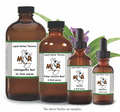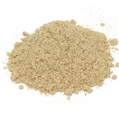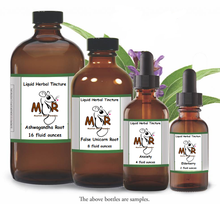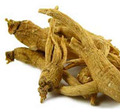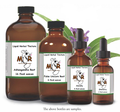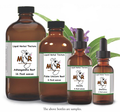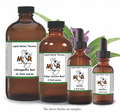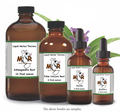 Loading... Please wait...
Loading... Please wait...- Home
- Herbal Tinctures
- Herbal Tinctures - Single Herbs
- Ginseng Root Tincture
Product Description
Ginseng Root Herbal Tincture
Also Known As - Panax quinquefolium
Origin - USA
American ginseng (Panax quinquefolis) is an herb that grows mainly in North America. Wild American ginseng is in such high demand that it has been declared a threatened or endangered species in some states in the United States.
People take American ginseng by mouth for stress, to boost the immune system, and as a stimulant.
American ginseng is often used to fight infections such as colds and flu. There is some evidence that it might help prevent colds and flu and make symptoms milder when infections do occur.
American ginseng is used for other infections including HIV/AIDS, infections of the intestine (dysentery), and particular infections (Pseudomonas infections) that are common in people with cystic fibrosis.
Some people use American ginseng to improve digestion and for loss of appetite, as well as for vomiting, inflammation of the colon (colitis), and inflammation of the lining of the stomach (gastritis).
American ginseng is also used for low iron in the blood (anemia), diabetes, insulin resistance related to HIV treatments, cancer-related fatigue, high blood pressure,trouble sleeping (insomnia), nerve pain, erectile dysfunction (ED), fever, hangoversymptoms, attention deficit-hyperactivity disorder (ADHD), blood and bleeding disorders, breast cancer, dizziness, headaches, convulsions, fibromyalgia, “hardening of the arteries” (atherosclerosis), memory loss, rheumatoid arthritis,schizophrenia, improving athletic performance, improving mental performance, as an anti-aging aid, menopausal symptoms, complications during pregnancy or childbirth, and for nervous exhaustion (neurasthenia).
You may also see American ginseng listed as an ingredient in some soft drinks. Oils and extracts made from American ginseng are used in soaps and cosmetics.
Don’t confuse American ginseng with Siberian ginseng (Eleutherococcus senticosus) or Asian ginseng (Panax ginseng). They have different medicinal effects.
How does it work?
American ginseng contains chemicals called ginsenosides that seem to affect insulin levels in the body and lower blood sugar. Other chemicals, called polysaccharides, might affect the immune system.
Effective for:
- Diabetes. Taking 3 grams of American ginseng by mouth, up to two hours before a meal, can lower blood sugar after a meal in patients with type 2 diabetes. However, larger doses do not seem to have a greater effect. Taking 100-200 mg of American ginseng by mouth for 8 weeks might also help lower pre-meal blood sugar levels in patients with type 2 diabetes. Different American ginseng products may have different effects. Researchers think that is because they contain different amounts of the active chemicals called ginsenosides.
- Respiratory tract infections. Some research suggests that taking a specific American ginseng extract called CVT-E002 (Cold-FX, Afexa Life Sciences, Canada) 200 mg twice daily for 3-4 months during flu season might prevent cold or flu symptoms in adults between the ages of 18 and 65. People older than 65 seem to need a flu shot at month 2 along with this treatment in order to decrease their risk of getting the flu or colds. This extract also seems to help make symptoms milder and last a shorter length of time when infections do occur. Some evidence suggests that the extract might not reduce the chance of getting the first cold of a season, but it seems to reduce the risk of getting repeat colds in a season. However, it might not help prevent cold or flu-like symptoms in patients with weakened immune systems.
- Athletic performance. Taking 1600 mg of American ginseng by mouth for 4 weeks does not seem to improve athletic performance. But it might decrease muscle damage during exercise.
Herbs to Combine/Supplement - Ginseng may be combined with ginkgo biloba to improve mental abilities.
Parts Used - The root is the plant portion used medicinally. It can be found powdered in capsules, as tea or combined in formulas.
American ginseng is SAFE when taken by mouth appropriately, short-term. Doses of 100-3000 mg daily have been used safely for up to 12 weeks. Single doses of up to 10 grams have also been safely used. In addition, a specific American ginseng extract called CVT-E002 (Cold-FX, Afexa Life Sciences, Canada) has also been used safely for up to 4 months.
When taken by mouth, American ginseng can cause some side effects including diarrhea, itching, trouble sleeping (insomnia), headache, and nervousness. In some people, American ginseng might also cause rapid heartbeat, increased blood pressure or decreased blood pressure, breast tenderness, vaginal bleeding in women, and other side effects. Uncommon side effects that have been reported include a severe rash called Stevens-Johnson syndrome, liver damage, and severe allergic reaction.
Special Precautions & Warnings:
Children: American ginseng is SAFE for children when taken by mouth appropriately, short-term. A specific American ginseng extract called CVT-E002 (Cold-FX, Afexa Life Sciences, Canada) has been used in doses of 4.5-26 mg daily for 3 days in children 3-12 years-old.
Pregnancy and breast-feeding: American ginseng is UNSAFE in pregnancy. One of the chemicals in Panax ginseng, a plant related to American ginseng, has been linked to possible birth defects. Do not take American ginseng if you are pregnant.
There is not enough reliable information about the safety of taking American ginseng if you are breast feeding. Stay on the safe side and avoid use.
Diabetes: American ginseng might lower blood sugar. In people with diabetes who are taking medications to lower blood sugar, adding American ginseng might lower it too much. Monitor your blood sugar closely if you have diabetes and use American ginseng.
Hormone-sensitive conditions such as breast cancer, uterine cancer, ovarian cancer, endometriosis, or uterine fibroids: American ginseng preparations that contain chemicals called ginsenosides might act like estrogen. If you have any condition that might be made worse by exposure to estrogen, don’t use American ginseng that contains ginsenosides. However, some American ginseng extracts have had the ginsenosides removed (Cold-fX, Afexa Life Sciences, Canada). American ginseng extracts such as these that contain no ginsenosides or contain only a low concentration of ginsenosides do not appear to act like estrogen.
Trouble sleeping (insomnia): High doses of American ginseng have been linked with insomnia. If you have trouble sleeping, use American ginseng with caution.
Schizophrenia (a mental disorder): High doses of American ginseng have been linked with sleep problems and agitation in people with schizophrenia . Be careful when using American ginseng if you have schizophrenia.
Surgery: American ginseng might affect blood sugar levels and might interfere with blood sugar control during and after surgery. Stop taking American ginseng at least 2 weeks before a scheduled surgery.
The following doses have been studied in scientific research:
BY MOUTH:
- For reducing blood sugar in people with type 2 diabetes: 3 grams up to 2 hours before a meal. American ginseng should be taken within 2 hours of a meal. If it is taken too long before eating, the blood sugar might become too low.100-200 mg of American ginseng have been taken daily for up to 8 weeks.
- For preventing upper respiratory tract infections such as the common cold or flu: a specific American ginseng extract called CVT-E002 (Cold-fX, Afexa Life Sciences, Canada) 200 mg twice daily for 3-4 months has been used.
-
Dosing: According to the Complete German Commission E Monographs , crude preparations of dried root powder 1 to 2 g can be taken daily for up to 3 months. In numerous clinical trials, the dosage of crude root has ranged from 0.5 to 3 g/day and the dose of tinctures has generally ranged from 100 to 400 mg.
Conditions of Use and Important Information: This information is meant to supplement, not replace advice from your doctor or healthcare provider and is not meant to cover all possible uses, precautions, interactions or adverse effects. This information may not fit your specific health circumstances. Never delay or disregard seeking professional medical advice from your doctor or other qualified health care provider because of something you have read on Mountain Maus Remedies. You should always speak with your doctor or health care professional before you start, stop, or change any prescribed part of your health care plan or treatment and to determine what course of therapy is right for you.
This copyrighted material is provided by Natural Medicines Comprehensive Database Consumer Version. Information from this source is evidence-based and objective, and without commercial influence. For professional medical information on natural medicines, see Natural Medicines Comprehensive Database Professional Version. © Therapeutic Research Faculty 2009.







